Developing Manager Report: Management Styles and Self-Assessment
VerifiedAdded on 2020/06/06
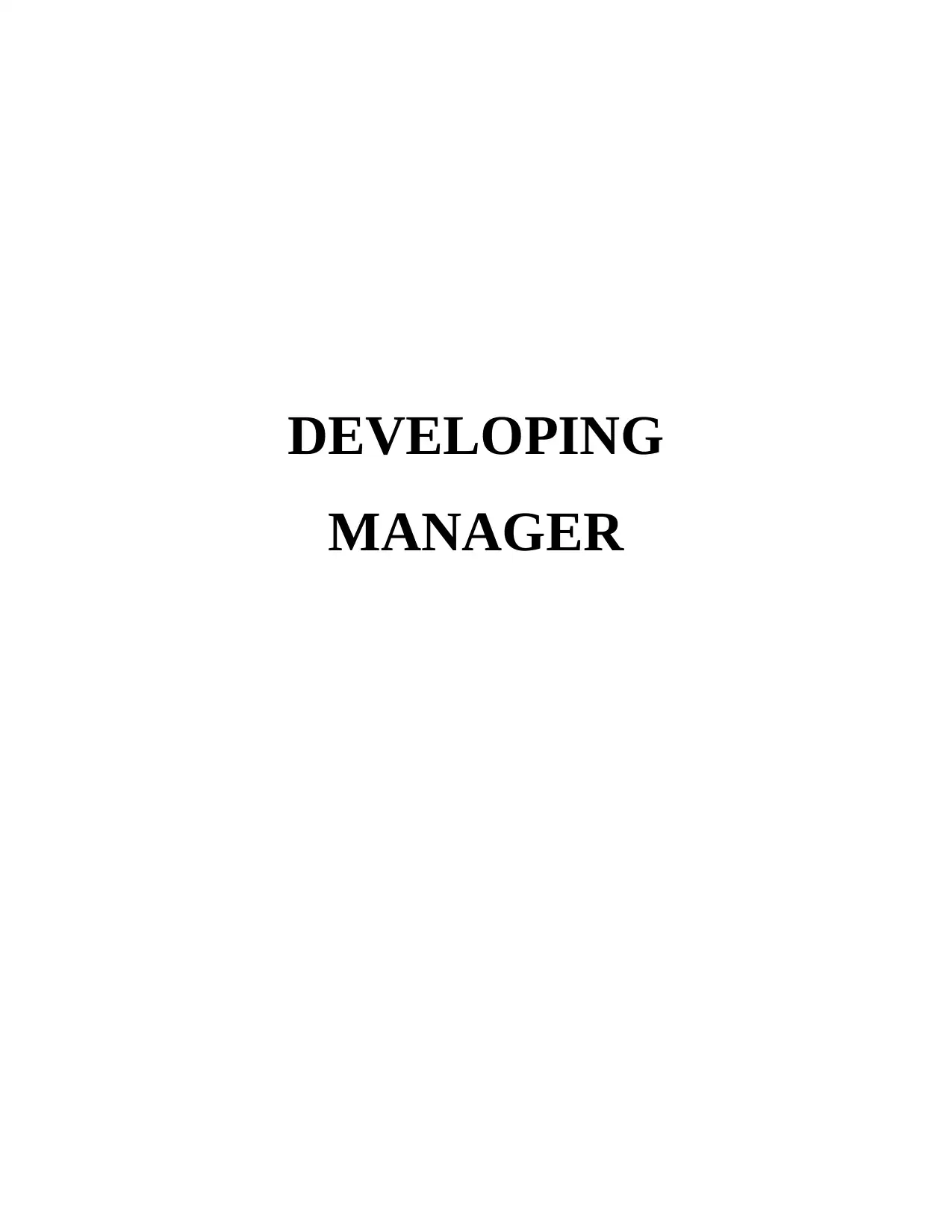
MANAGER
Paraphrase This Document
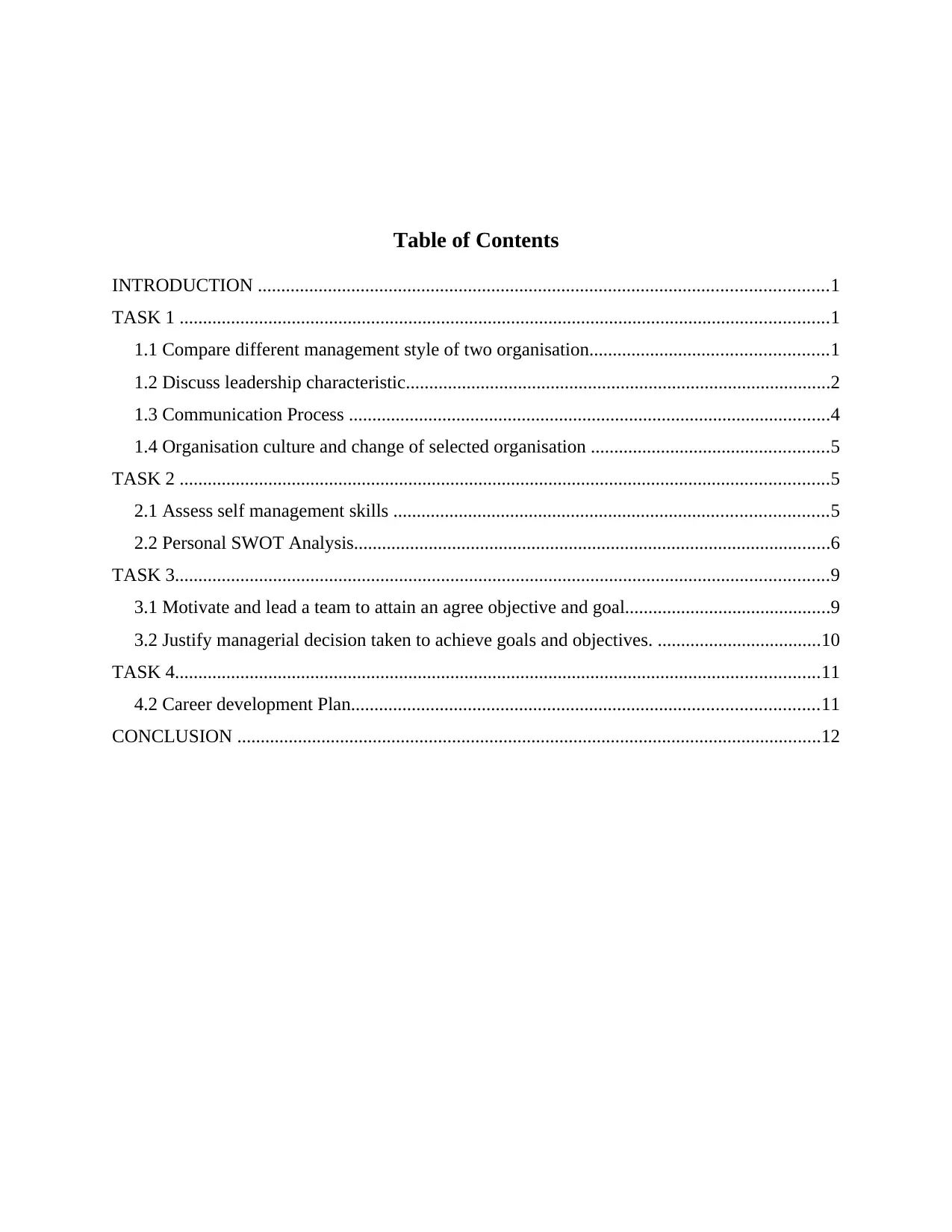
INTRODUCTION ..........................................................................................................................1
TASK 1 ...........................................................................................................................................1
1.1 Compare different management style of two organisation...................................................1
1.2 Discuss leadership characteristic...........................................................................................2
1.3 Communication Process .......................................................................................................4
1.4 Organisation culture and change of selected organisation ...................................................5
TASK 2 ...........................................................................................................................................5
2.1 Assess self management skills .............................................................................................5
2.2 Personal SWOT Analysis......................................................................................................6
TASK 3............................................................................................................................................9
3.1 Motivate and lead a team to attain an agree objective and goal............................................9
3.2 Justify managerial decision taken to achieve goals and objectives. ...................................10
TASK 4..........................................................................................................................................11
4.2 Career development Plan....................................................................................................11
CONCLUSION .............................................................................................................................12

⊘ This is a preview!⊘
Do you want full access?
Subscribe today to unlock all pages.

Trusted by 1+ million students worldwide
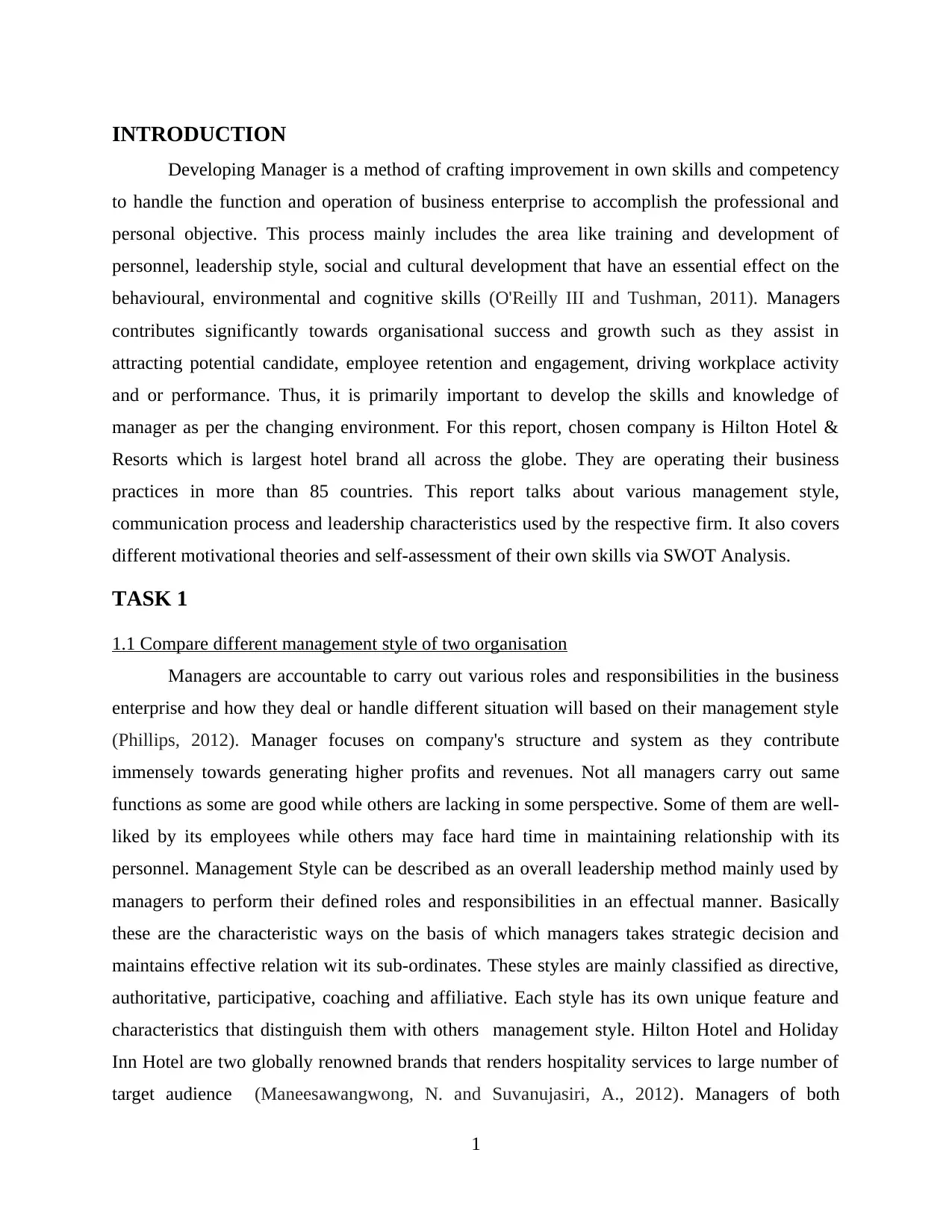
Developing Manager is a method of crafting improvement in own skills and competency
to handle the function and operation of business enterprise to accomplish the professional and
personal objective. This process mainly includes the area like training and development of
personnel, leadership style, social and cultural development that have an essential effect on the
behavioural, environmental and cognitive skills (O'Reilly III and Tushman, 2011). Managers
contributes significantly towards organisational success and growth such as they assist in
attracting potential candidate, employee retention and engagement, driving workplace activity
and or performance. Thus, it is primarily important to develop the skills and knowledge of
manager as per the changing environment. For this report, chosen company is Hilton Hotel &
Resorts which is largest hotel brand all across the globe. They are operating their business
practices in more than 85 countries. This report talks about various management style,
communication process and leadership characteristics used by the respective firm. It also covers
different motivational theories and self-assessment of their own skills via SWOT Analysis.
TASK 1
1.1 Compare different management style of two organisation
Managers are accountable to carry out various roles and responsibilities in the business
enterprise and how they deal or handle different situation will based on their management style
(Phillips, 2012). Manager focuses on company's structure and system as they contribute
immensely towards generating higher profits and revenues. Not all managers carry out same
functions as some are good while others are lacking in some perspective. Some of them are well-
liked by its employees while others may face hard time in maintaining relationship with its
personnel. Management Style can be described as an overall leadership method mainly used by
managers to perform their defined roles and responsibilities in an effectual manner. Basically
these are the characteristic ways on the basis of which managers takes strategic decision and
maintains effective relation wit its sub-ordinates. These styles are mainly classified as directive,
authoritative, participative, coaching and affiliative. Each style has its own unique feature and
characteristics that distinguish them with others management style. Hilton Hotel and Holiday
Inn Hotel are two globally renowned brands that renders hospitality services to large number of
target audience (Maneesawangwong, N. and Suvanujasiri, A., 2012). Managers of both
1
Paraphrase This Document
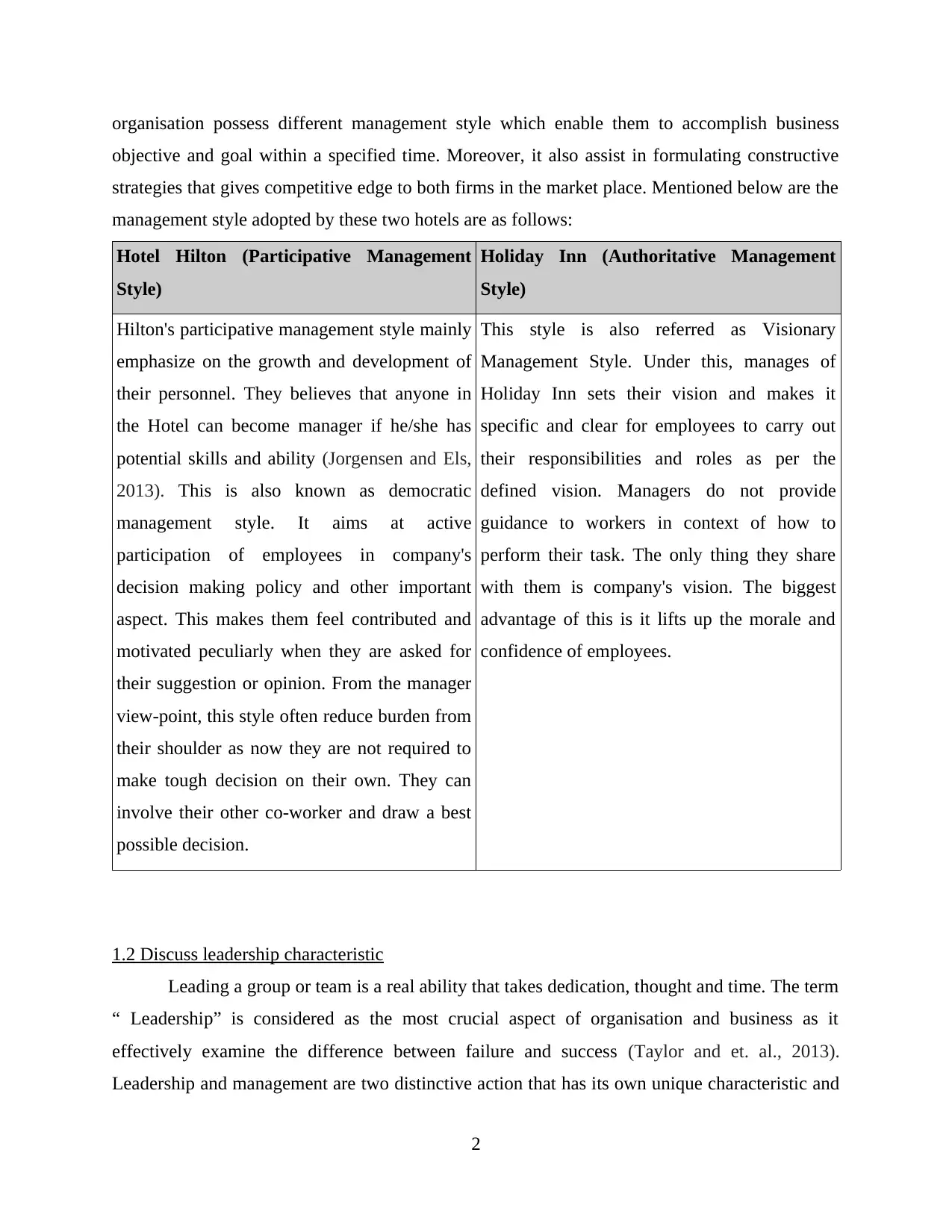
objective and goal within a specified time. Moreover, it also assist in formulating constructive
strategies that gives competitive edge to both firms in the market place. Mentioned below are the
management style adopted by these two hotels are as follows:
Hotel Hilton (Participative Management
Style)
Holiday Inn (Authoritative Management
Style)
Hilton's participative management style mainly
emphasize on the growth and development of
their personnel. They believes that anyone in
the Hotel can become manager if he/she has
potential skills and ability (Jorgensen and Els,
2013). This is also known as democratic
management style. It aims at active
participation of employees in company's
decision making policy and other important
aspect. This makes them feel contributed and
motivated peculiarly when they are asked for
their suggestion or opinion. From the manager
view-point, this style often reduce burden from
their shoulder as now they are not required to
make tough decision on their own. They can
involve their other co-worker and draw a best
possible decision.
This style is also referred as Visionary
Management Style. Under this, manages of
Holiday Inn sets their vision and makes it
specific and clear for employees to carry out
their responsibilities and roles as per the
defined vision. Managers do not provide
guidance to workers in context of how to
perform their task. The only thing they share
with them is company's vision. The biggest
advantage of this is it lifts up the morale and
confidence of employees.
1.2 Discuss leadership characteristic
Leading a group or team is a real ability that takes dedication, thought and time. The term
“ Leadership” is considered as the most crucial aspect of organisation and business as it
effectively examine the difference between failure and success (Taylor and et. al., 2013).
Leadership and management are two distinctive action that has its own unique characteristic and
2
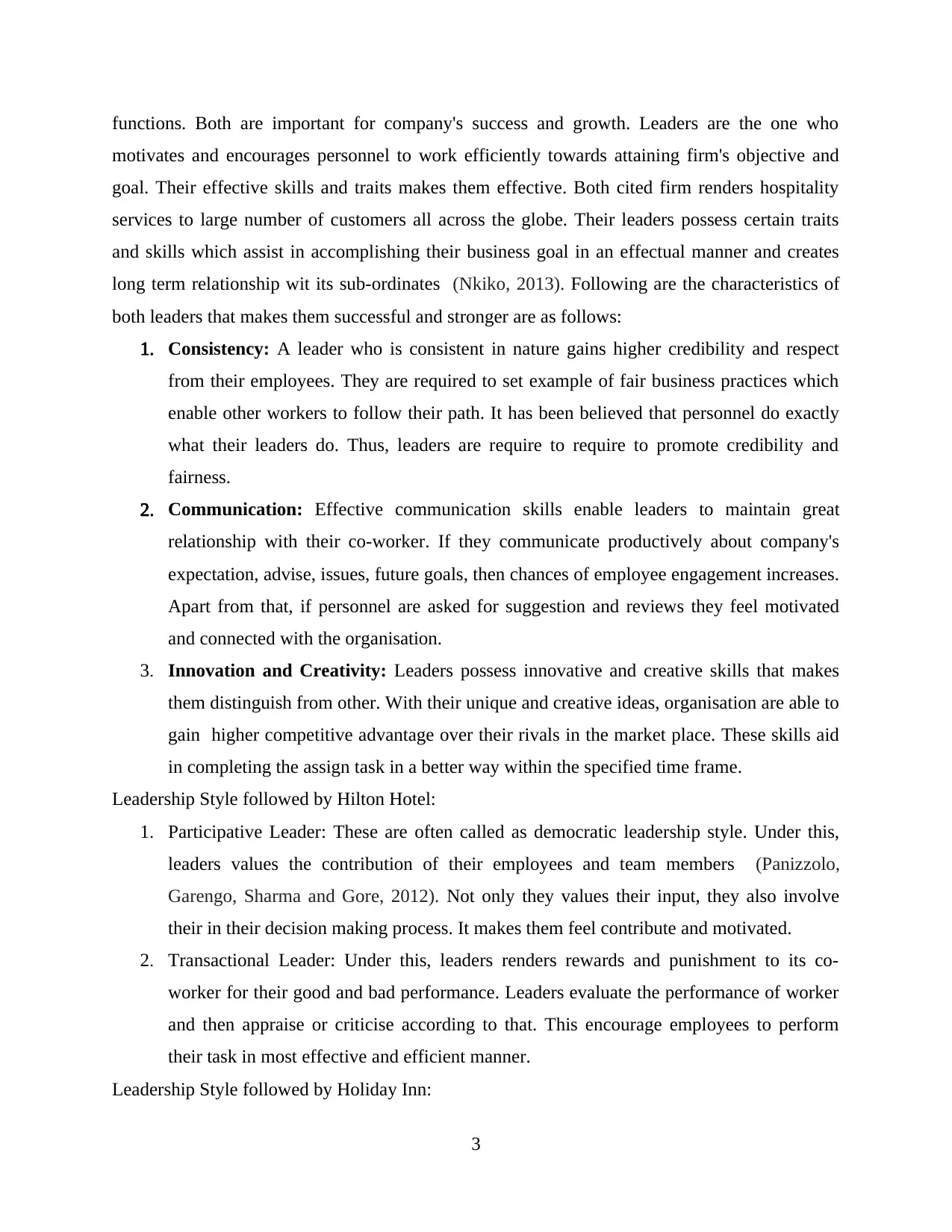
motivates and encourages personnel to work efficiently towards attaining firm's objective and
goal. Their effective skills and traits makes them effective. Both cited firm renders hospitality
services to large number of customers all across the globe. Their leaders possess certain traits
and skills which assist in accomplishing their business goal in an effectual manner and creates
long term relationship wit its sub-ordinates (Nkiko, 2013). Following are the characteristics of
both leaders that makes them successful and stronger are as follows:
1. Consistency: A leader who is consistent in nature gains higher credibility and respect
from their employees. They are required to set example of fair business practices which
enable other workers to follow their path. It has been believed that personnel do exactly
what their leaders do. Thus, leaders are require to require to promote credibility and
fairness.
2. Communication: Effective communication skills enable leaders to maintain great
relationship with their co-worker. If they communicate productively about company's
expectation, advise, issues, future goals, then chances of employee engagement increases.
Apart from that, if personnel are asked for suggestion and reviews they feel motivated
and connected with the organisation.
3. Innovation and Creativity: Leaders possess innovative and creative skills that makes
them distinguish from other. With their unique and creative ideas, organisation are able to
gain higher competitive advantage over their rivals in the market place. These skills aid
in completing the assign task in a better way within the specified time frame.
Leadership Style followed by Hilton Hotel:
1. Participative Leader: These are often called as democratic leadership style. Under this,
leaders values the contribution of their employees and team members (Panizzolo,
Garengo, Sharma and Gore, 2012). Not only they values their input, they also involve
their in their decision making process. It makes them feel contribute and motivated.
2. Transactional Leader: Under this, leaders renders rewards and punishment to its co-
worker for their good and bad performance. Leaders evaluate the performance of worker
and then appraise or criticise according to that. This encourage employees to perform
their task in most effective and efficient manner.
Leadership Style followed by Holiday Inn:
3
⊘ This is a preview!⊘
Do you want full access?
Subscribe today to unlock all pages.

Trusted by 1+ million students worldwide
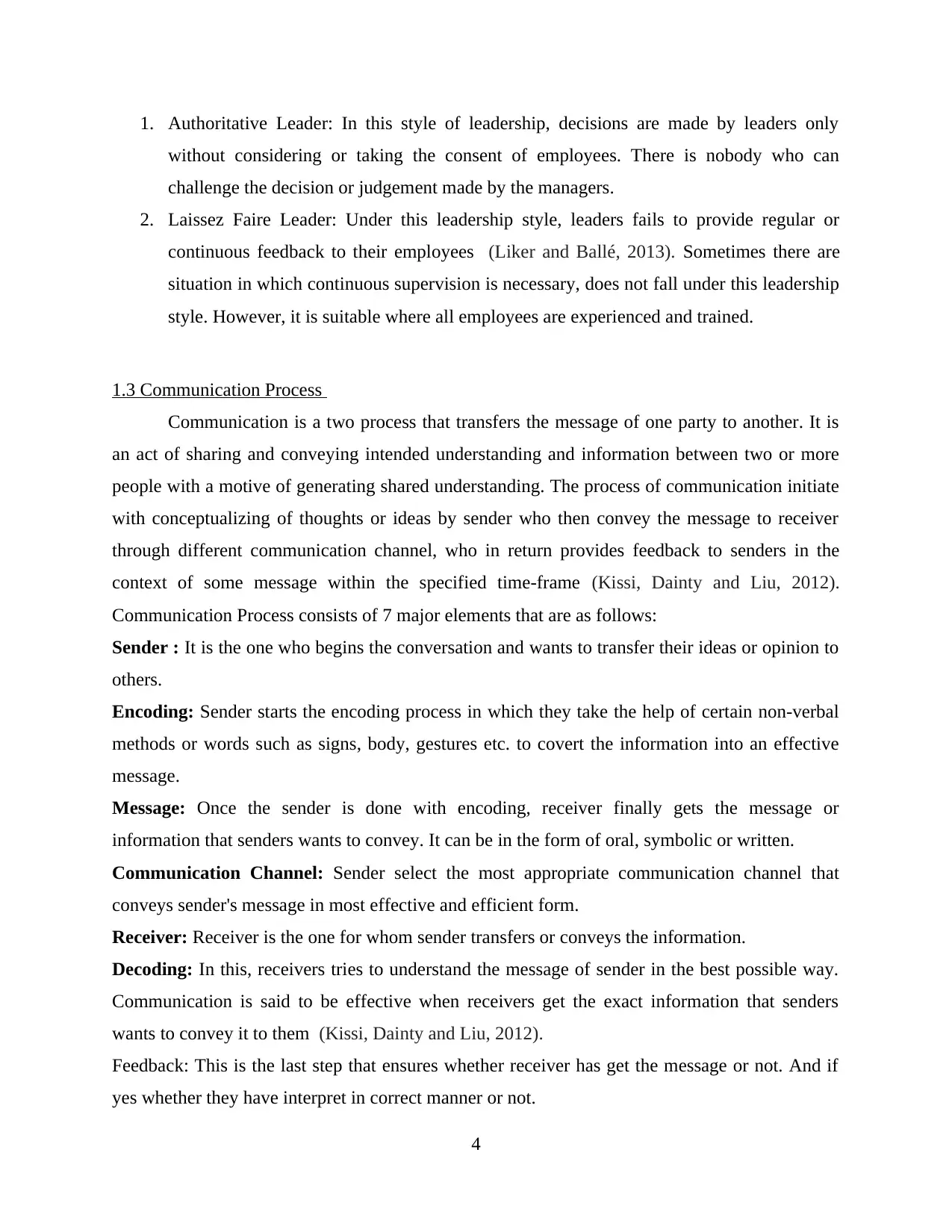
without considering or taking the consent of employees. There is nobody who can
challenge the decision or judgement made by the managers.
2. Laissez Faire Leader: Under this leadership style, leaders fails to provide regular or
continuous feedback to their employees (Liker and Ballé, 2013). Sometimes there are
situation in which continuous supervision is necessary, does not fall under this leadership
style. However, it is suitable where all employees are experienced and trained.
1.3 Communication Process
Communication is a two process that transfers the message of one party to another. It is
an act of sharing and conveying intended understanding and information between two or more
people with a motive of generating shared understanding. The process of communication initiate
with conceptualizing of thoughts or ideas by sender who then convey the message to receiver
through different communication channel, who in return provides feedback to senders in the
context of some message within the specified time-frame (Kissi, Dainty and Liu, 2012).
Communication Process consists of 7 major elements that are as follows:
Sender : It is the one who begins the conversation and wants to transfer their ideas or opinion to
others.
Encoding: Sender starts the encoding process in which they take the help of certain non-verbal
methods or words such as signs, body, gestures etc. to covert the information into an effective
message.
Message: Once the sender is done with encoding, receiver finally gets the message or
information that senders wants to convey. It can be in the form of oral, symbolic or written.
Communication Channel: Sender select the most appropriate communication channel that
conveys sender's message in most effective and efficient form.
Receiver: Receiver is the one for whom sender transfers or conveys the information.
Decoding: In this, receivers tries to understand the message of sender in the best possible way.
Communication is said to be effective when receivers get the exact information that senders
wants to convey it to them (Kissi, Dainty and Liu, 2012).
Feedback: This is the last step that ensures whether receiver has get the message or not. And if
yes whether they have interpret in correct manner or not.
4
Paraphrase This Document
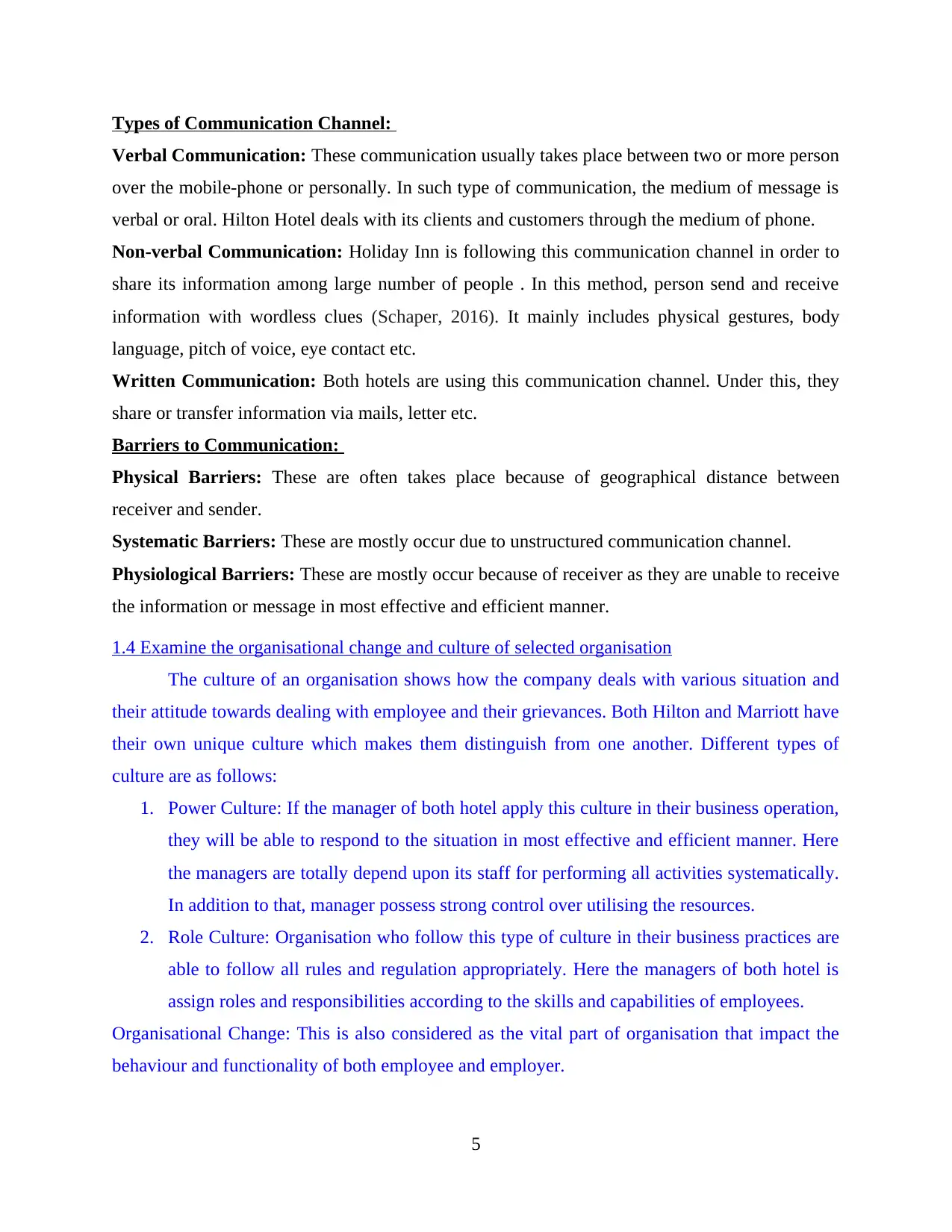
Verbal Communication: These communication usually takes place between two or more person
over the mobile-phone or personally. In such type of communication, the medium of message is
verbal or oral. Hilton Hotel deals with its clients and customers through the medium of phone.
Non-verbal Communication: Holiday Inn is following this communication channel in order to
share its information among large number of people . In this method, person send and receive
information with wordless clues (Schaper, 2016). It mainly includes physical gestures, body
language, pitch of voice, eye contact etc.
Written Communication: Both hotels are using this communication channel. Under this, they
share or transfer information via mails, letter etc.
Barriers to Communication:
Physical Barriers: These are often takes place because of geographical distance between
receiver and sender.
Systematic Barriers: These are mostly occur due to unstructured communication channel.
Physiological Barriers: These are mostly occur because of receiver as they are unable to receive
the information or message in most effective and efficient manner.
1.4 Examine the organisational change and culture of selected organisation
The culture of an organisation shows how the company deals with various situation and
their attitude towards dealing with employee and their grievances. Both Hilton and Marriott have
their own unique culture which makes them distinguish from one another. Different types of
culture are as follows:
1. Power Culture: If the manager of both hotel apply this culture in their business operation,
they will be able to respond to the situation in most effective and efficient manner. Here
the managers are totally depend upon its staff for performing all activities systematically.
In addition to that, manager possess strong control over utilising the resources.
2. Role Culture: Organisation who follow this type of culture in their business practices are
able to follow all rules and regulation appropriately. Here the managers of both hotel is
assign roles and responsibilities according to the skills and capabilities of employees.
Organisational Change: This is also considered as the vital part of organisation that impact the
behaviour and functionality of both employee and employer.
5
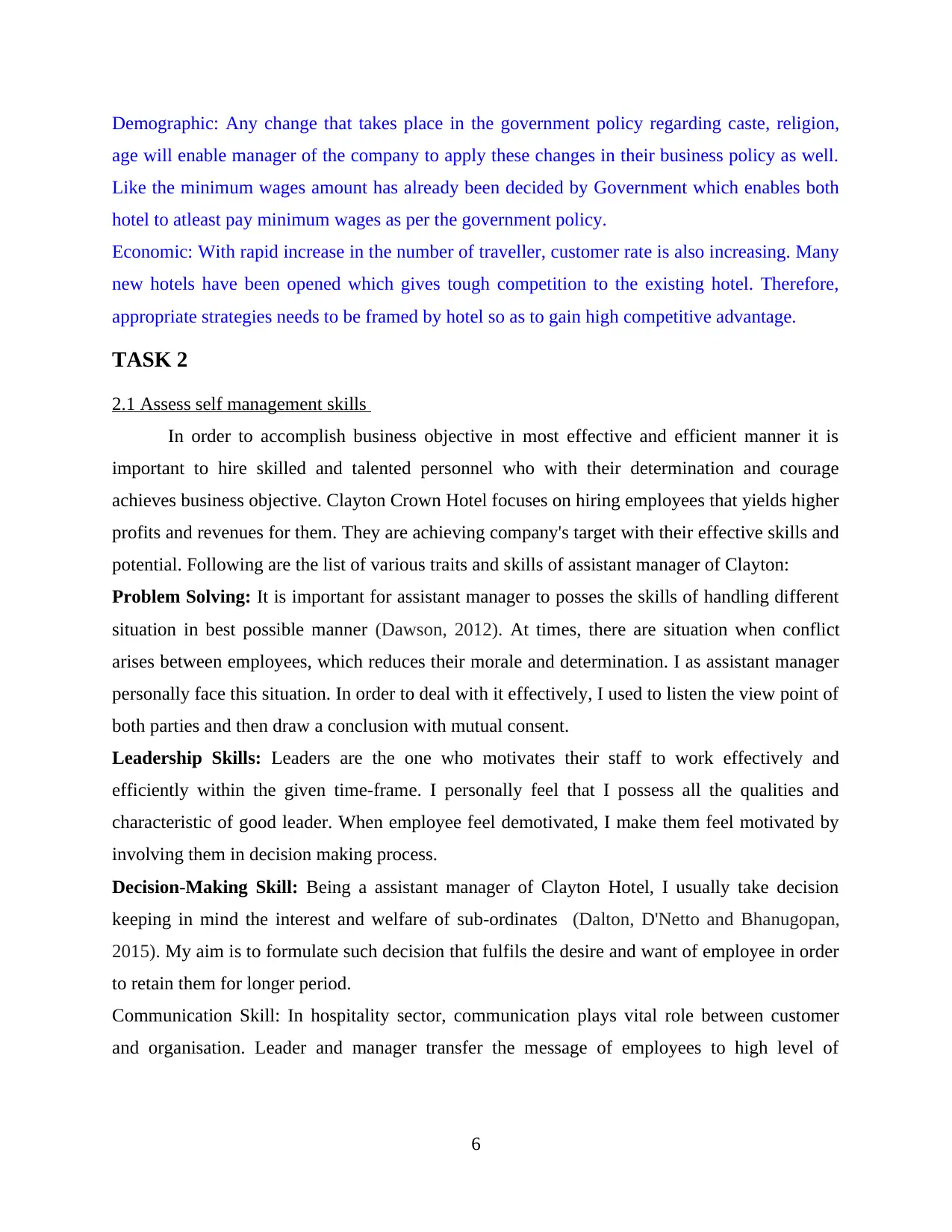
age will enable manager of the company to apply these changes in their business policy as well.
Like the minimum wages amount has already been decided by Government which enables both
hotel to atleast pay minimum wages as per the government policy.
Economic: With rapid increase in the number of traveller, customer rate is also increasing. Many
new hotels have been opened which gives tough competition to the existing hotel. Therefore,
appropriate strategies needs to be framed by hotel so as to gain high competitive advantage.
TASK 2
2.1 Assess self management skills
In order to accomplish business objective in most effective and efficient manner it is
important to hire skilled and talented personnel who with their determination and courage
achieves business objective. Clayton Crown Hotel focuses on hiring employees that yields higher
profits and revenues for them. They are achieving company's target with their effective skills and
potential. Following are the list of various traits and skills of assistant manager of Clayton:
Problem Solving: It is important for assistant manager to posses the skills of handling different
situation in best possible manner (Dawson, 2012). At times, there are situation when conflict
arises between employees, which reduces their morale and determination. I as assistant manager
personally face this situation. In order to deal with it effectively, I used to listen the view point of
both parties and then draw a conclusion with mutual consent.
Leadership Skills: Leaders are the one who motivates their staff to work effectively and
efficiently within the given time-frame. I personally feel that I possess all the qualities and
characteristic of good leader. When employee feel demotivated, I make them feel motivated by
involving them in decision making process.
Decision-Making Skill: Being a assistant manager of Clayton Hotel, I usually take decision
keeping in mind the interest and welfare of sub-ordinates (Dalton, D'Netto and Bhanugopan,
2015). My aim is to formulate such decision that fulfils the desire and want of employee in order
to retain them for longer period.
Communication Skill: In hospitality sector, communication plays vital role between customer
and organisation. Leader and manager transfer the message of employees to high level of
6
⊘ This is a preview!⊘
Do you want full access?
Subscribe today to unlock all pages.

Trusted by 1+ million students worldwide
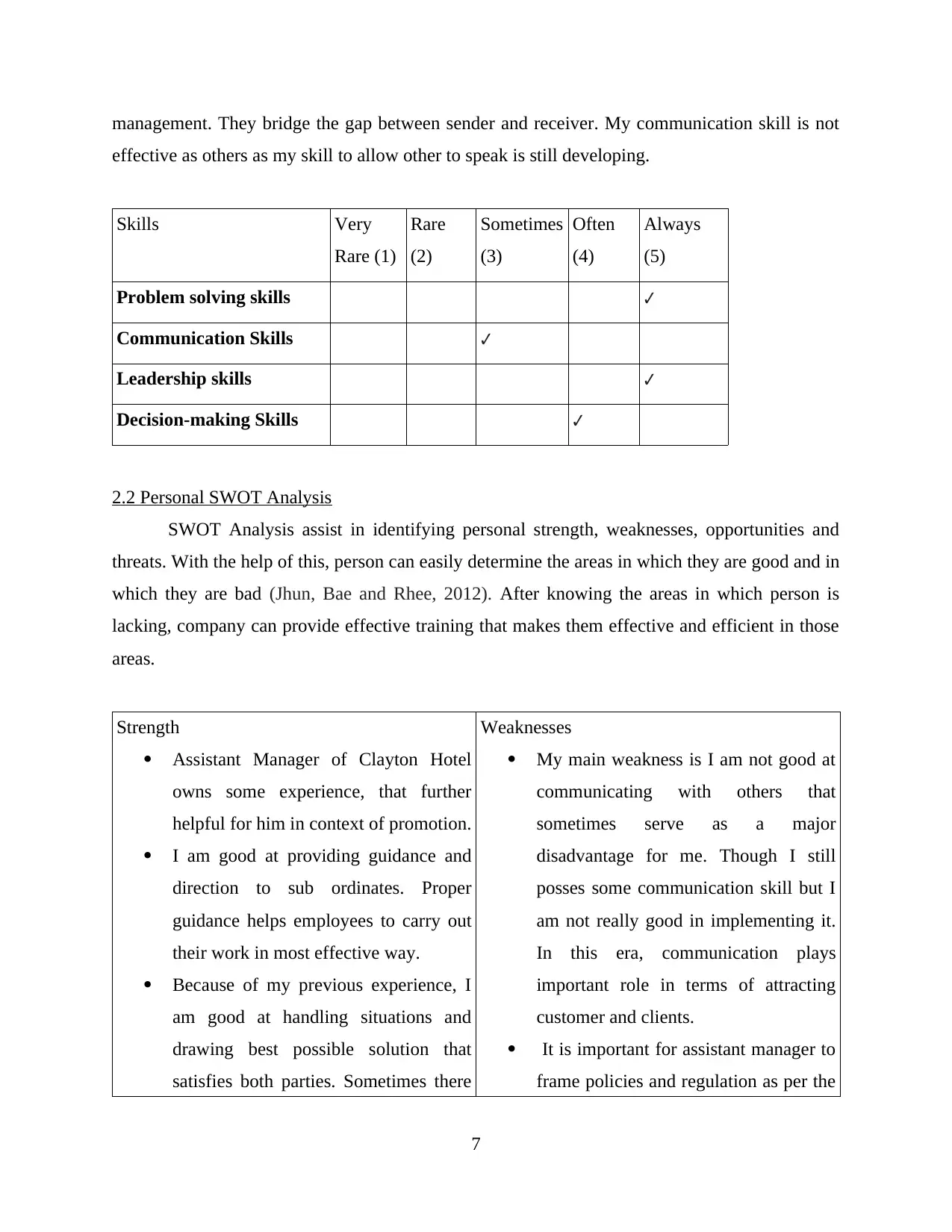
effective as others as my skill to allow other to speak is still developing.
Skills Very
Rare (1)
Rare
(2)
Sometimes
(3)
Often
(4)
Always
(5)
Problem solving skills ✔
Communication Skills ✔
Leadership skills ✔
Decision-making Skills ✔
2.2 Personal SWOT Analysis
SWOT Analysis assist in identifying personal strength, weaknesses, opportunities and
threats. With the help of this, person can easily determine the areas in which they are good and in
which they are bad (Jhun, Bae and Rhee, 2012). After knowing the areas in which person is
lacking, company can provide effective training that makes them effective and efficient in those
areas.
Strength
Assistant Manager of Clayton Hotel
owns some experience, that further
helpful for him in context of promotion.
I am good at providing guidance and
direction to sub ordinates. Proper
guidance helps employees to carry out
their work in most effective way.
Because of my previous experience, I
am good at handling situations and
drawing best possible solution that
satisfies both parties. Sometimes there
Weaknesses
My main weakness is I am not good at
communicating with others that
sometimes serve as a major
disadvantage for me. Though I still
posses some communication skill but I
am not really good in implementing it.
In this era, communication plays
important role in terms of attracting
customer and clients.
It is important for assistant manager to
frame policies and regulation as per the
7
Paraphrase This Document
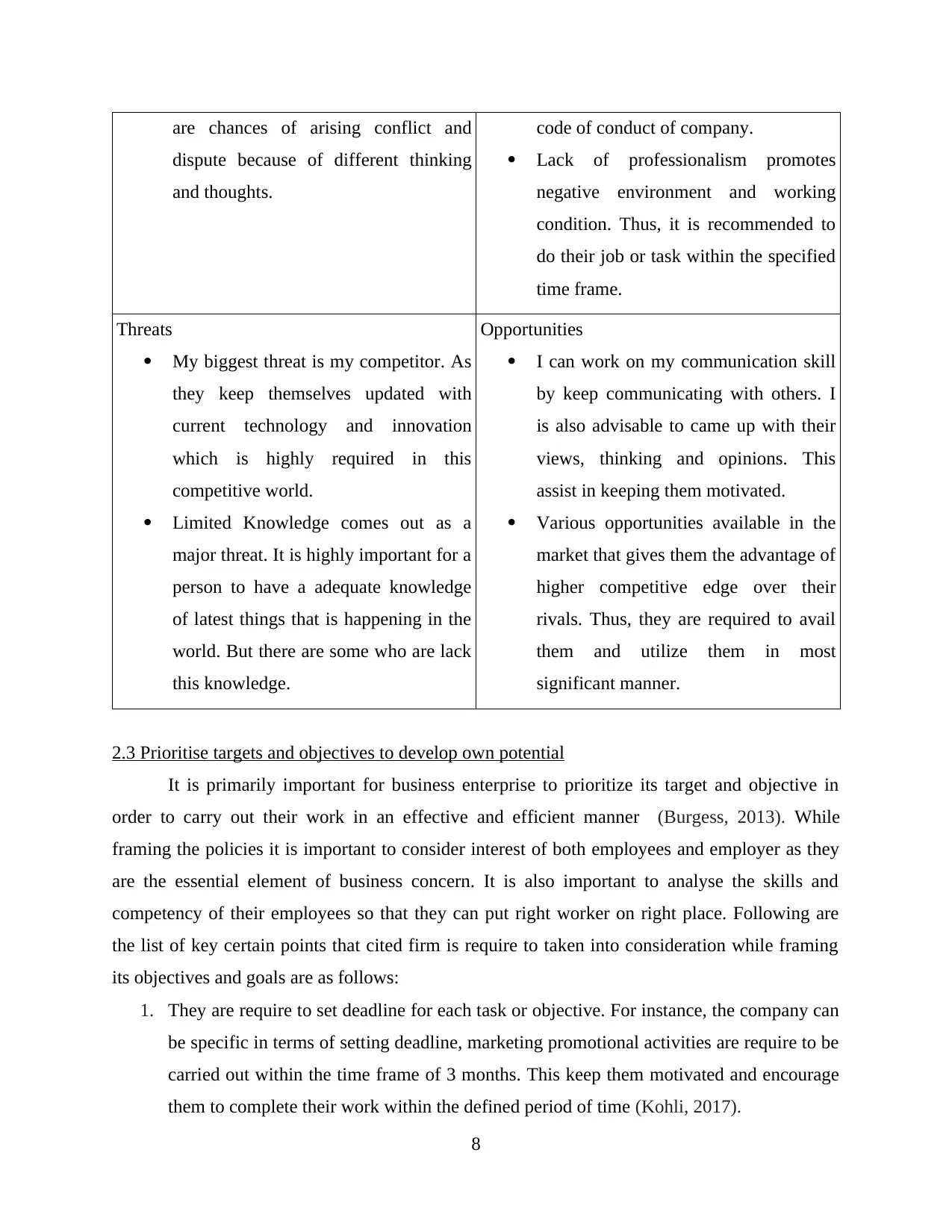
dispute because of different thinking
and thoughts.
code of conduct of company.
Lack of professionalism promotes
negative environment and working
condition. Thus, it is recommended to
do their job or task within the specified
time frame.
Threats
My biggest threat is my competitor. As
they keep themselves updated with
current technology and innovation
which is highly required in this
competitive world.
Limited Knowledge comes out as a
major threat. It is highly important for a
person to have a adequate knowledge
of latest things that is happening in the
world. But there are some who are lack
this knowledge.
Opportunities
I can work on my communication skill
by keep communicating with others. I
is also advisable to came up with their
views, thinking and opinions. This
assist in keeping them motivated.
Various opportunities available in the
market that gives them the advantage of
higher competitive edge over their
rivals. Thus, they are required to avail
them and utilize them in most
significant manner.
2.3 Prioritise targets and objectives to develop own potential
It is primarily important for business enterprise to prioritize its target and objective in
order to carry out their work in an effective and efficient manner (Burgess, 2013). While
framing the policies it is important to consider interest of both employees and employer as they
are the essential element of business concern. It is also important to analyse the skills and
competency of their employees so that they can put right worker on right place. Following are
the list of key certain points that cited firm is require to taken into consideration while framing
its objectives and goals are as follows:
1. They are require to set deadline for each task or objective. For instance, the company can
be specific in terms of setting deadline, marketing promotional activities are require to be
carried out within the time frame of 3 months. This keep them motivated and encourage
them to complete their work within the defined period of time (Kohli, 2017).
8
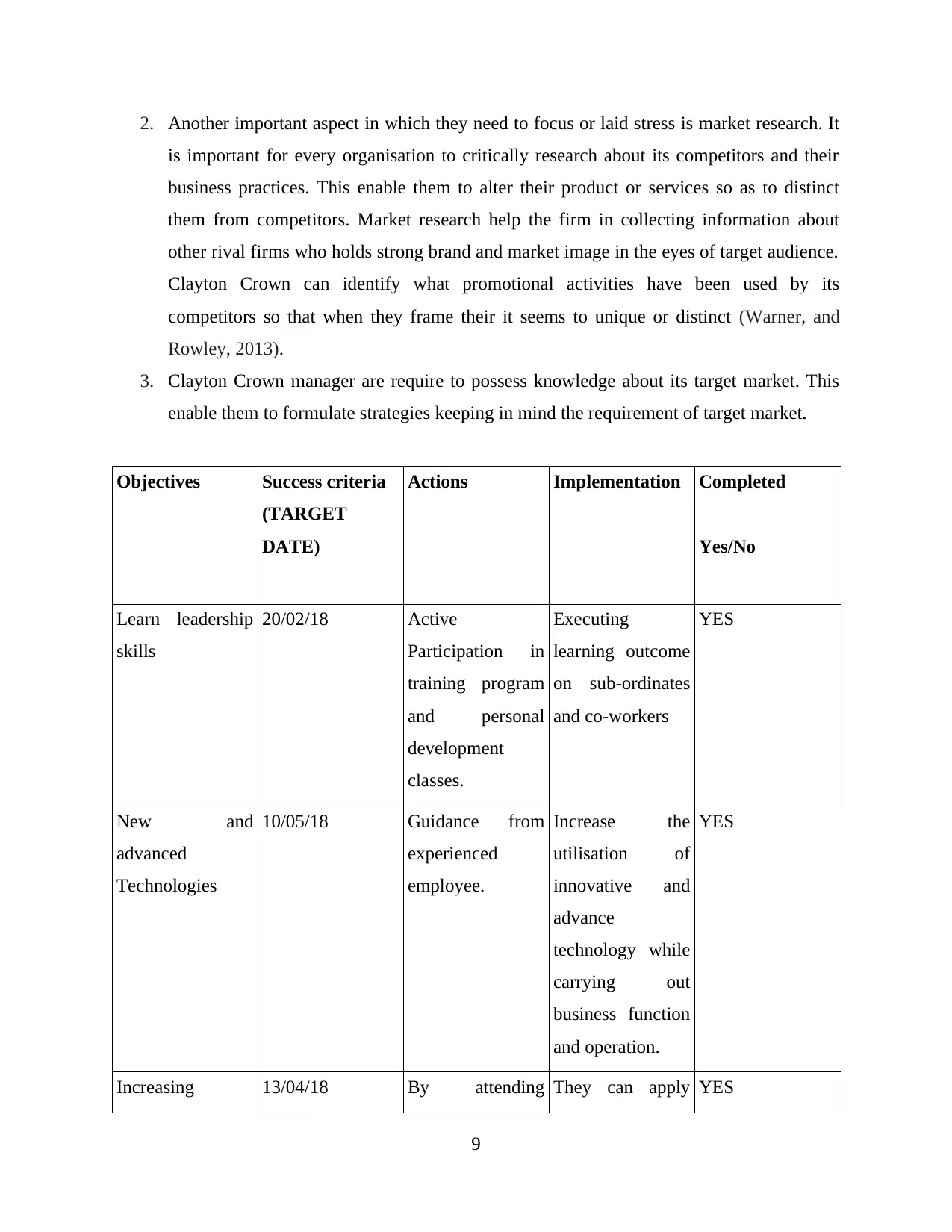
is important for every organisation to critically research about its competitors and their
business practices. This enable them to alter their product or services so as to distinct
them from competitors. Market research help the firm in collecting information about
other rival firms who holds strong brand and market image in the eyes of target audience.
Clayton Crown can identify what promotional activities have been used by its
competitors so that when they frame their it seems to unique or distinct (Warner, and
Rowley, 2013).
3. Clayton Crown manager are require to possess knowledge about its target market. This
enable them to formulate strategies keeping in mind the requirement of target market.
Objectives Success criteria
(TARGET
DATE)
Actions Implementation Completed
Yes/No
Learn leadership
skills
20/02/18 Active
Participation in
training program
and personal
development
classes.
Executing
learning outcome
on sub-ordinates
and co-workers
YES
New and
advanced
Technologies
10/05/18 Guidance from
experienced
employee.
Increase the
utilisation of
innovative and
advance
technology while
carrying out
business function
and operation.
YES
Increasing 13/04/18 By attending They can apply YES
9
⊘ This is a preview!⊘
Do you want full access?
Subscribe today to unlock all pages.

Trusted by 1+ million students worldwide
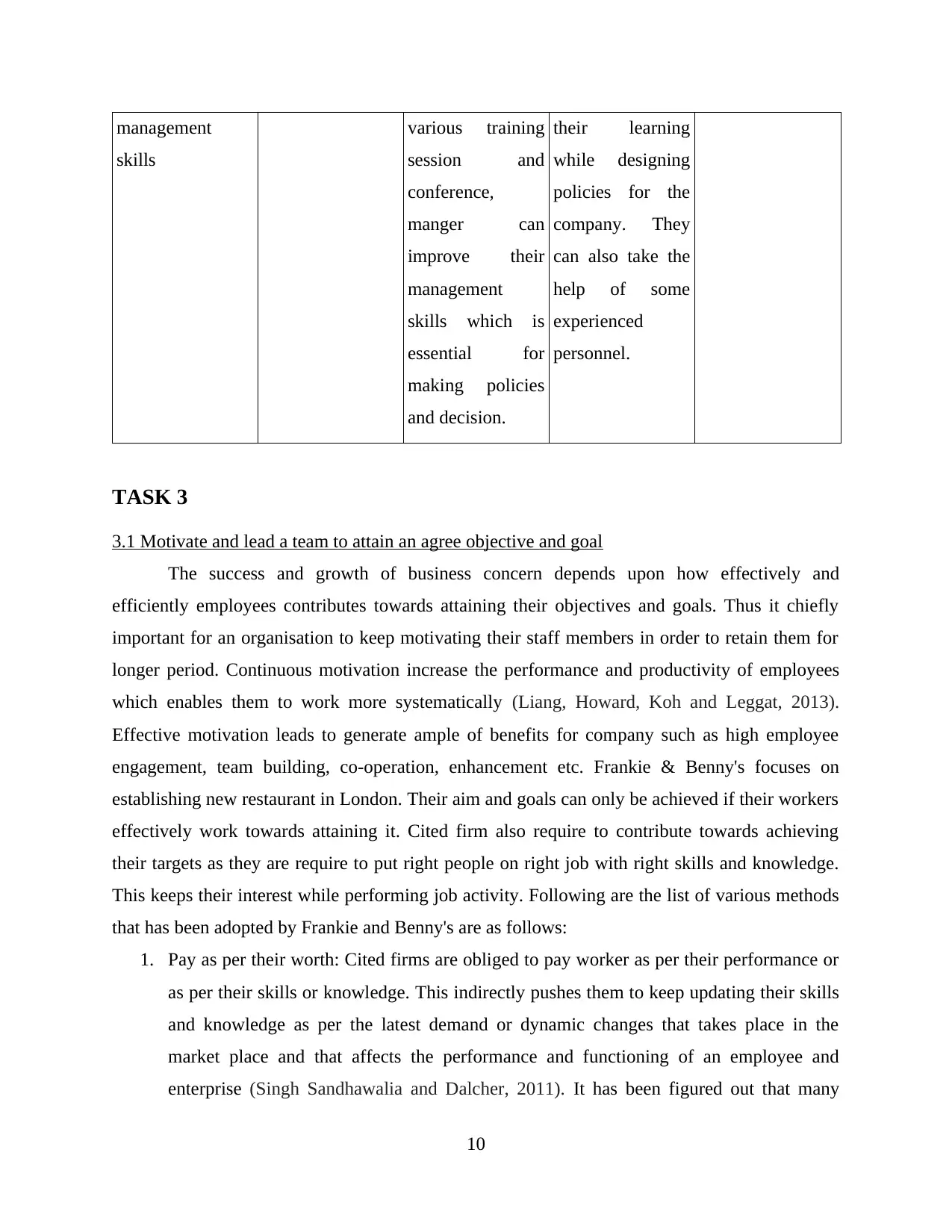
skills
various training
session and
conference,
manger can
improve their
management
skills which is
essential for
making policies
and decision.
their learning
while designing
policies for the
company. They
can also take the
help of some
experienced
personnel.
TASK 3
3.1 Motivate and lead a team to attain an agree objective and goal
The success and growth of business concern depends upon how effectively and
efficiently employees contributes towards attaining their objectives and goals. Thus it chiefly
important for an organisation to keep motivating their staff members in order to retain them for
longer period. Continuous motivation increase the performance and productivity of employees
which enables them to work more systematically (Liang, Howard, Koh and Leggat, 2013).
Effective motivation leads to generate ample of benefits for company such as high employee
engagement, team building, co-operation, enhancement etc. Frankie & Benny's focuses on
establishing new restaurant in London. Their aim and goals can only be achieved if their workers
effectively work towards attaining it. Cited firm also require to contribute towards achieving
their targets as they are require to put right people on right job with right skills and knowledge.
This keeps their interest while performing job activity. Following are the list of various methods
that has been adopted by Frankie and Benny's are as follows:
1. Pay as per their worth: Cited firms are obliged to pay worker as per their performance or
as per their skills or knowledge. This indirectly pushes them to keep updating their skills
and knowledge as per the latest demand or dynamic changes that takes place in the
market place and that affects the performance and functioning of an employee and
enterprise (Singh Sandhawalia and Dalcher, 2011). It has been figured out that many
10
Paraphrase This Document
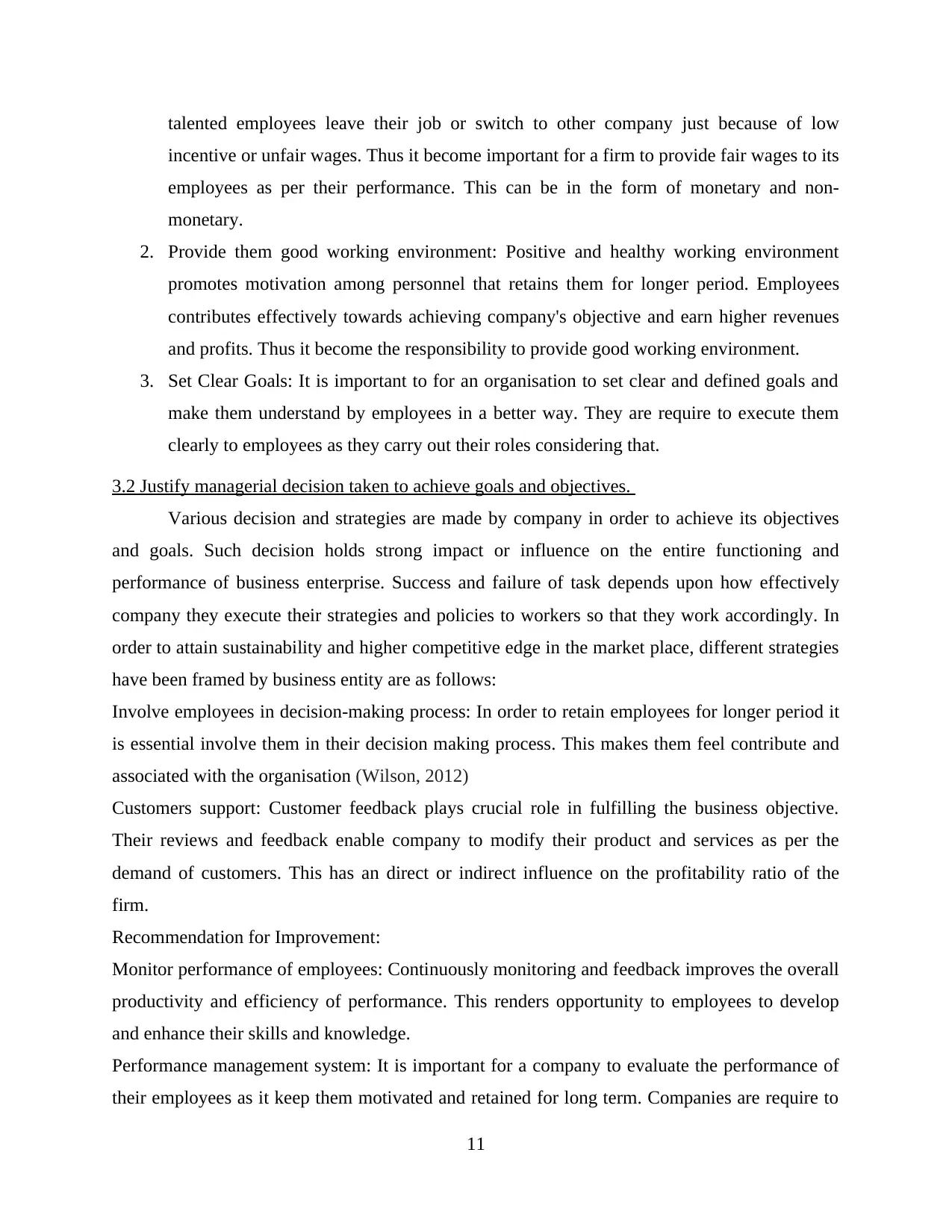
incentive or unfair wages. Thus it become important for a firm to provide fair wages to its
employees as per their performance. This can be in the form of monetary and non-
monetary.
2. Provide them good working environment: Positive and healthy working environment
promotes motivation among personnel that retains them for longer period. Employees
contributes effectively towards achieving company's objective and earn higher revenues
and profits. Thus it become the responsibility to provide good working environment.
3. Set Clear Goals: It is important to for an organisation to set clear and defined goals and
make them understand by employees in a better way. They are require to execute them
clearly to employees as they carry out their roles considering that.
3.2 Justify managerial decision taken to achieve goals and objectives.
Various decision and strategies are made by company in order to achieve its objectives
and goals. Such decision holds strong impact or influence on the entire functioning and
performance of business enterprise. Success and failure of task depends upon how effectively
company they execute their strategies and policies to workers so that they work accordingly. In
order to attain sustainability and higher competitive edge in the market place, different strategies
have been framed by business entity are as follows:
Involve employees in decision-making process: In order to retain employees for longer period it
is essential involve them in their decision making process. This makes them feel contribute and
associated with the organisation (Wilson, 2012)
Customers support: Customer feedback plays crucial role in fulfilling the business objective.
Their reviews and feedback enable company to modify their product and services as per the
demand of customers. This has an direct or indirect influence on the profitability ratio of the
firm.
Recommendation for Improvement:
Monitor performance of employees: Continuously monitoring and feedback improves the overall
productivity and efficiency of performance. This renders opportunity to employees to develop
and enhance their skills and knowledge.
Performance management system: It is important for a company to evaluate the performance of
their employees as it keep them motivated and retained for long term. Companies are require to
11
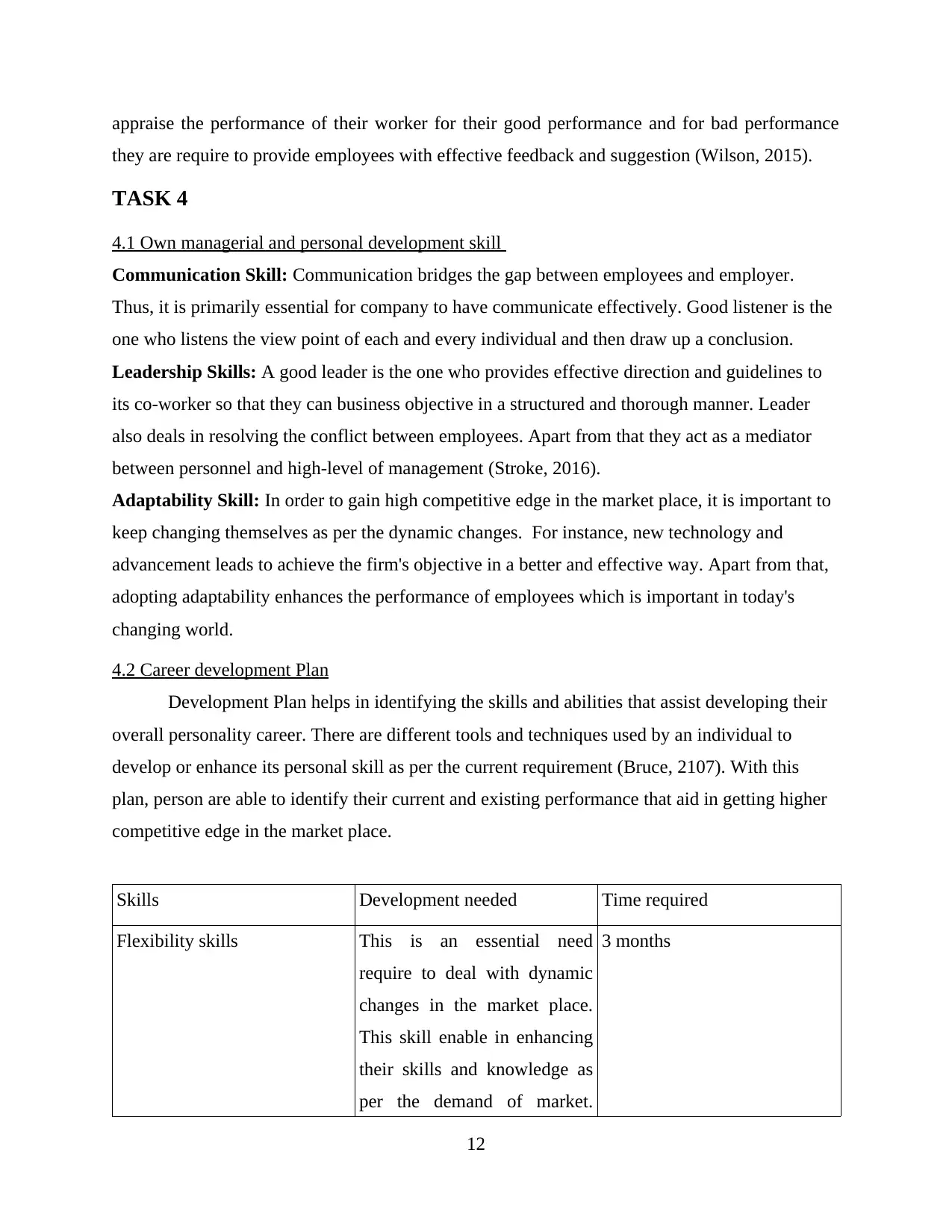
they are require to provide employees with effective feedback and suggestion (Wilson, 2015).
TASK 4
4.1 Own managerial and personal development skill
Communication Skill: Communication bridges the gap between employees and employer.
Thus, it is primarily essential for company to have communicate effectively. Good listener is the
one who listens the view point of each and every individual and then draw up a conclusion.
Leadership Skills: A good leader is the one who provides effective direction and guidelines to
its co-worker so that they can business objective in a structured and thorough manner. Leader
also deals in resolving the conflict between employees. Apart from that they act as a mediator
between personnel and high-level of management (Stroke, 2016).
Adaptability Skill: In order to gain high competitive edge in the market place, it is important to
keep changing themselves as per the dynamic changes. For instance, new technology and
advancement leads to achieve the firm's objective in a better and effective way. Apart from that,
adopting adaptability enhances the performance of employees which is important in today's
changing world.
4.2 Career development Plan
Development Plan helps in identifying the skills and abilities that assist developing their
overall personality career. There are different tools and techniques used by an individual to
develop or enhance its personal skill as per the current requirement (Bruce, 2107). With this
plan, person are able to identify their current and existing performance that aid in getting higher
competitive edge in the market place.
Skills Development needed Time required
Flexibility skills This is an essential need
require to deal with dynamic
changes in the market place.
This skill enable in enhancing
their skills and knowledge as
per the demand of market.
3 months
12
⊘ This is a preview!⊘
Do you want full access?
Subscribe today to unlock all pages.

Trusted by 1+ million students worldwide
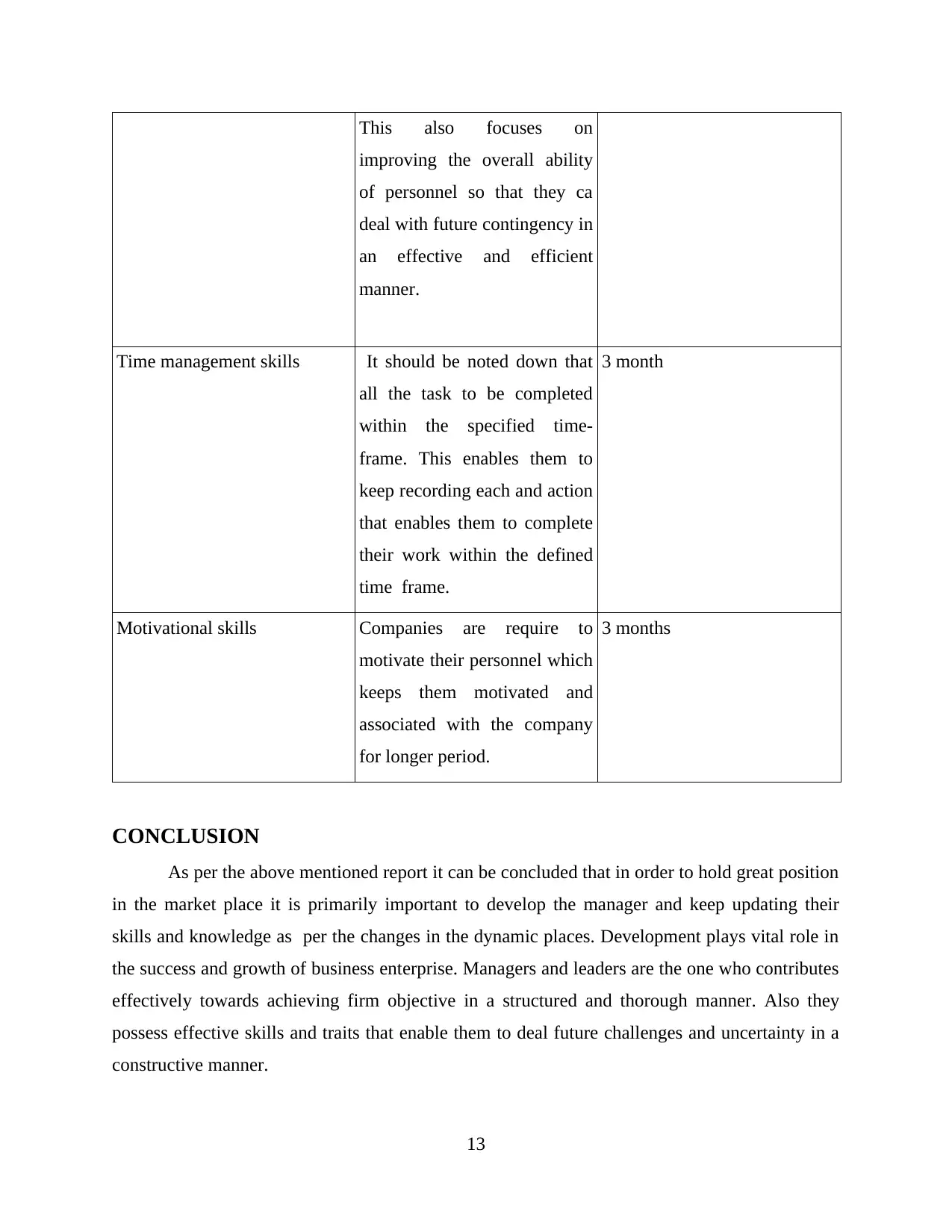
improving the overall ability
of personnel so that they ca
deal with future contingency in
an effective and efficient
manner.
Time management skills It should be noted down that
all the task to be completed
within the specified time-
frame. This enables them to
keep recording each and action
that enables them to complete
their work within the defined
time frame.
3 month
Motivational skills Companies are require to
motivate their personnel which
keeps them motivated and
associated with the company
for longer period.
3 months
CONCLUSION
As per the above mentioned report it can be concluded that in order to hold great position
in the market place it is primarily important to develop the manager and keep updating their
skills and knowledge as per the changes in the dynamic places. Development plays vital role in
the success and growth of business enterprise. Managers and leaders are the one who contributes
effectively towards achieving firm objective in a structured and thorough manner. Also they
possess effective skills and traits that enable them to deal future challenges and uncertainty in a
constructive manner.
13
Paraphrase This Document
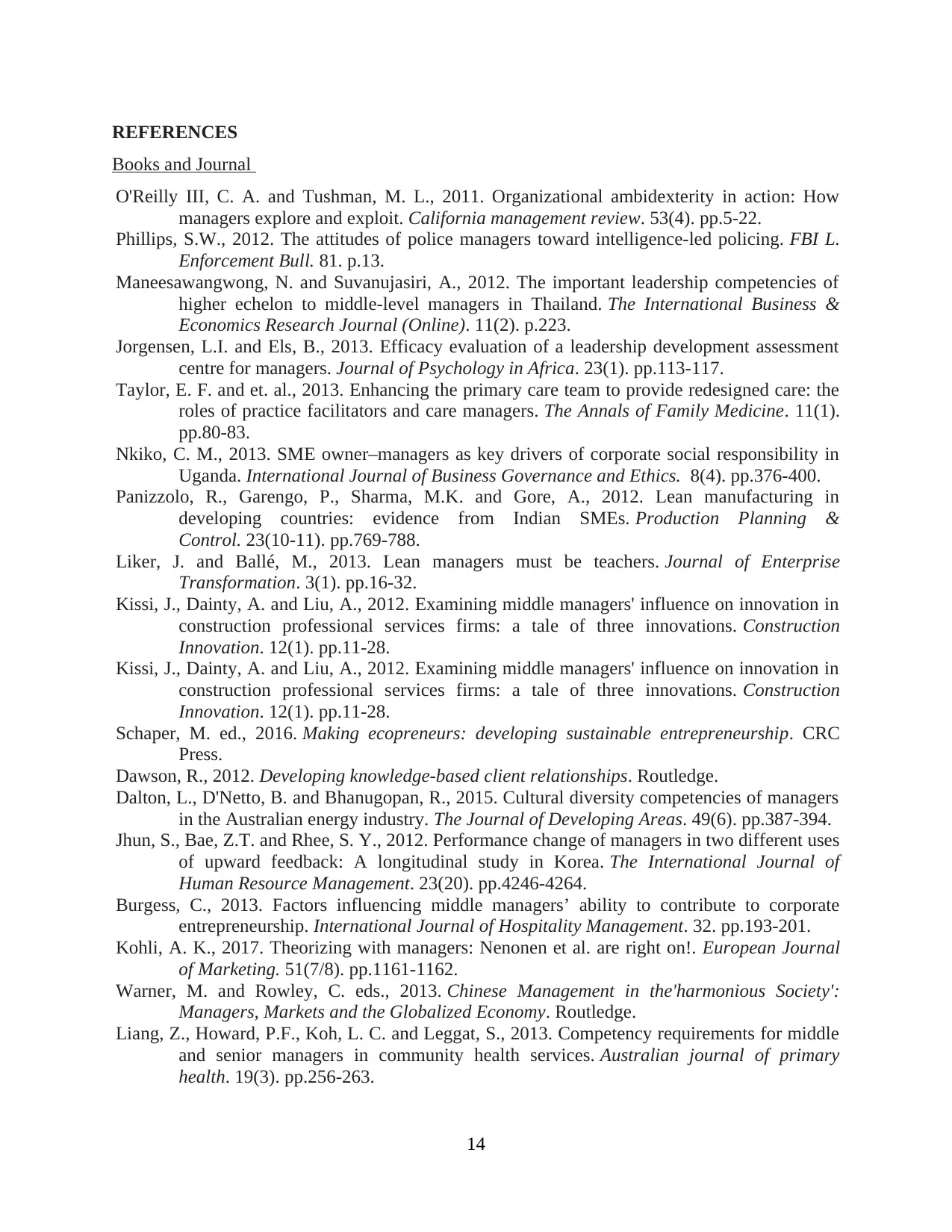
Books and Journal
O'Reilly III, C. A. and Tushman, M. L., 2011. Organizational ambidexterity in action: How
managers explore and exploit. California management review. 53(4). pp.5-22.
Phillips, S.W., 2012. The attitudes of police managers toward intelligence-led policing. FBI L.
Enforcement Bull. 81. p.13.
Maneesawangwong, N. and Suvanujasiri, A., 2012. The important leadership competencies of
higher echelon to middle-level managers in Thailand. The International Business &
Economics Research Journal (Online). 11(2). p.223.
Jorgensen, L.I. and Els, B., 2013. Efficacy evaluation of a leadership development assessment
centre for managers. Journal of Psychology in Africa. 23(1). pp.113-117.
Taylor, E. F. and et. al., 2013. Enhancing the primary care team to provide redesigned care: the
roles of practice facilitators and care managers. The Annals of Family Medicine. 11(1).
pp.80-83.
Nkiko, C. M., 2013. SME owner–managers as key drivers of corporate social responsibility in
Uganda. International Journal of Business Governance and Ethics. 8(4). pp.376-400.
Panizzolo, R., Garengo, P., Sharma, M.K. and Gore, A., 2012. Lean manufacturing in
developing countries: evidence from Indian SMEs. Production Planning &
Control. 23(10-11). pp.769-788.
Liker, J. and Ballé, M., 2013. Lean managers must be teachers. Journal of Enterprise
Transformation. 3(1). pp.16-32.
Kissi, J., Dainty, A. and Liu, A., 2012. Examining middle managers' influence on innovation in
construction professional services firms: a tale of three innovations. Construction
Innovation. 12(1). pp.11-28.
Kissi, J., Dainty, A. and Liu, A., 2012. Examining middle managers' influence on innovation in
construction professional services firms: a tale of three innovations. Construction
Innovation. 12(1). pp.11-28.
Schaper, M. ed., 2016. Making ecopreneurs: developing sustainable entrepreneurship. CRC
Press.
Dawson, R., 2012. Developing knowledge-based client relationships. Routledge.
Dalton, L., D'Netto, B. and Bhanugopan, R., 2015. Cultural diversity competencies of managers
in the Australian energy industry. The Journal of Developing Areas. 49(6). pp.387-394.
Jhun, S., Bae, Z.T. and Rhee, S. Y., 2012. Performance change of managers in two different uses
of upward feedback: A longitudinal study in Korea. The International Journal of
Human Resource Management. 23(20). pp.4246-4264.
Burgess, C., 2013. Factors influencing middle managers’ ability to contribute to corporate
entrepreneurship. International Journal of Hospitality Management. 32. pp.193-201.
Kohli, A. K., 2017. Theorizing with managers: Nenonen et al. are right on!. European Journal
of Marketing. 51(7/8). pp.1161-1162.
Warner, M. and Rowley, C. eds., 2013. Chinese Management in the'harmonious Society':
Managers, Markets and the Globalized Economy. Routledge.
Liang, Z., Howard, P.F., Koh, L. C. and Leggat, S., 2013. Competency requirements for middle
and senior managers in community health services. Australian journal of primary
health. 19(3). pp.256-263.
14
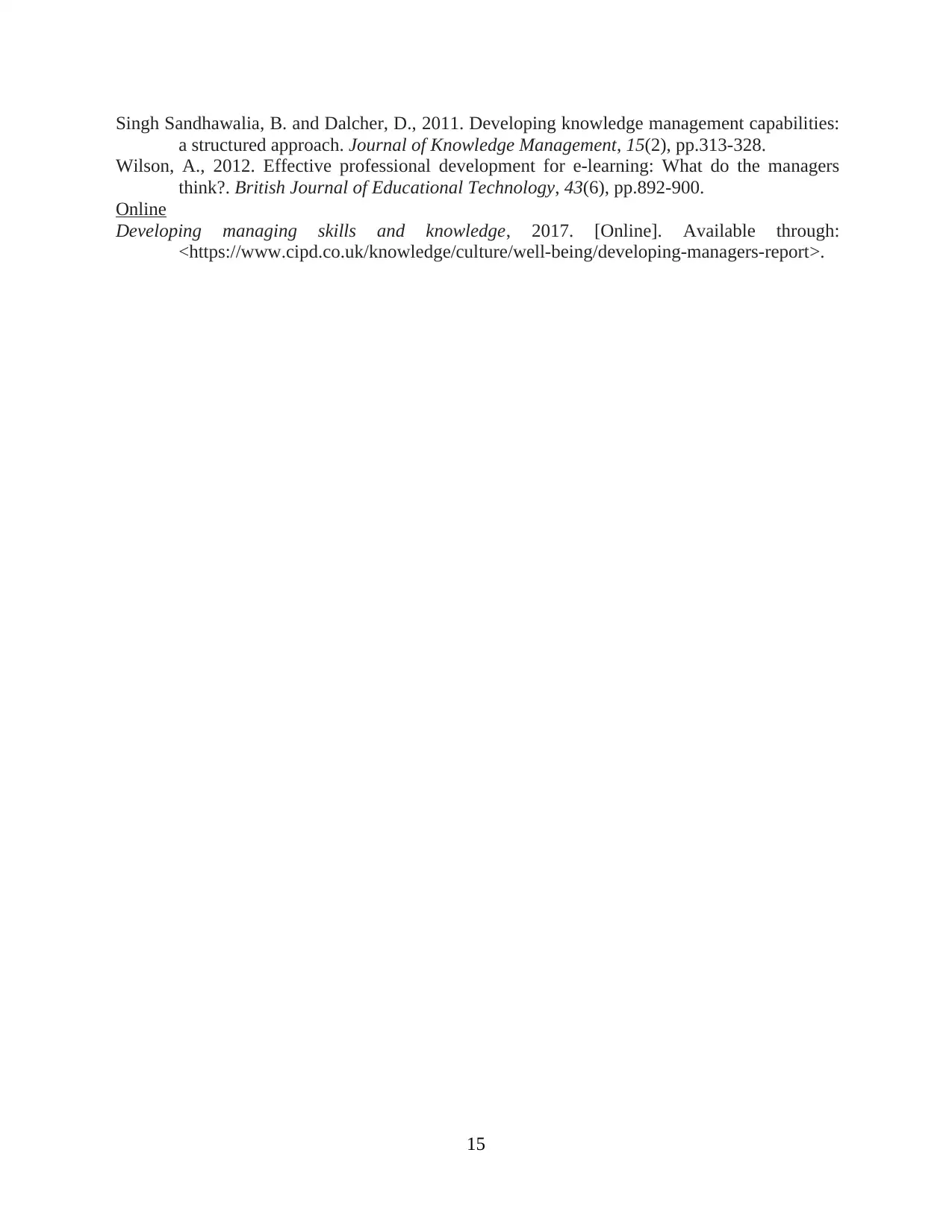
a structured approach. Journal of Knowledge Management, 15(2), pp.313-328.
Wilson, A., 2012. Effective professional development for e‐learning: What do the managers
think?. British Journal of Educational Technology, 43(6), pp.892-900.
Online
Developing managing skills and knowledge, 2017. [Online]. Available through:
<https://www.cipd.co.uk/knowledge/culture/well-being/developing-managers-report>.
15
⊘ This is a preview!⊘
Do you want full access?
Subscribe today to unlock all pages.

Trusted by 1+ million students worldwide

Related Documents
Your All-in-One AI-Powered Toolkit for Academic Success.
+13062052269
info@desklib.com
Available 24*7 on WhatsApp / Email
![[object Object]](/_next/static/media/star-bottom.7253800d.svg)
© 2024 | Zucol Services PVT LTD | All rights reserved.





